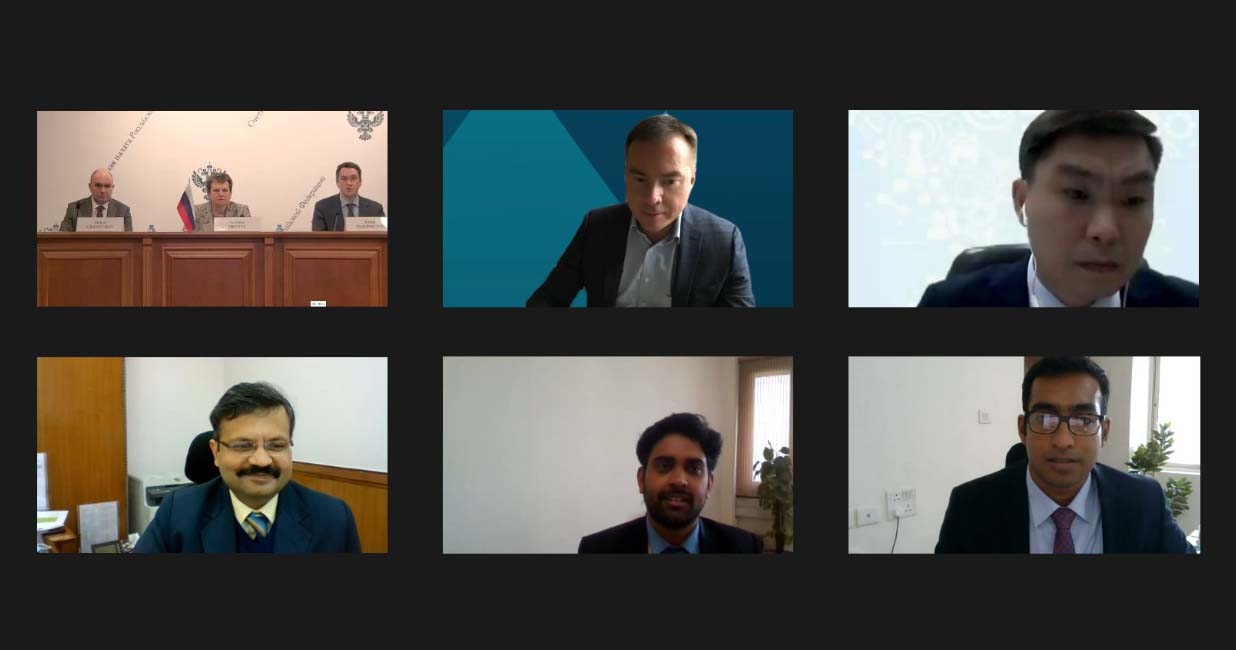
Russian and Indian SAIs exchanged experience on digitalization and audit of public administration
On January 20, a bilateral seminar of the Accounts Chamber of the Russian Federation and the Office of the Comptroller and Auditor General of India on “Audit of Public Administration and its Improvement” and “Digitalization” was held through videoconference.
In the first section of the seminar, Saurabh Singh, Senior Deputy Accountant General of the Audit Management Group II of the Office of the Comptroller and Auditor General of India, presented the results of audits in such spheres as Delhi Police activities, the implementation of Goods & Services Tax and the provision of clean cooking fuel to the population. It was noted that women participation in Delhi Police has increased, the cybercrime clearance rate has improved and 90% of providing people with liquefied petroleum gas target was achieved. The implementation of a new invoice matching system expanded the use of digital technologies in taxation and made taxation safer and more convenient for citizens.
Svetlana Orlova, Auditor of the Accounts Chamber of the Russian Federation, told about Russian experience in audits of public administration. The Auditor highlighted the importance of effective public administration for society:
Why do we pay so much attention to public administration? Public administration is a piece of service as well. It is of prime importance that ministries and agencies promptly respond to the needs of society and public administration serves the society development goals. Public administration is a key element to the development of any country.
Citizens shall perceive that the governance is effective and competitive.
Anti-corruption, healthcare, digitalization and cybersecurity are the main areas of audit in this field. Svetlana Orlova stressed that not all government offices are effectively introducing digital products and special emphasis should be laid on cybersecurity in public administration matters. Moreover, the Auditor stated, the publicity and openness of the data contribute greatly to the quality of public authorities' work. It is also essential to improve audit reports’ quality through external control and methods of analytical assessment.
Digitalization was discussed more thoroughly in the second section of the seminar. Sreeraj Ashok, Senior Deputy Accountant General, Accounts & Voucher Level Computerisation, spoke on behalf of India. In his presentation he focused on the tools that SAI India uses to improve internal business processes and auditing, from information gathering to the final report publication. These are “One Indian Audit & Accounts Department (IAAD) One System” (OIOS), Integrated Financial Management System (IFMS), E-Office. Sreeraj Ashok also spoke about India's remote sensing with satellites, Unmanned Aerial Vehicle (UAVs), Google Maps and Google Earth:
During the pandemic, we started using Google Earth and Google Maps for conducting audit. Certainly, the data obtained from these services is not decisive and does not constitute our final audit conclusion. Since data from Google Earth and Google Maps is provided in time series, we send UAVs and auditors to the area to get up-to-date information. After that, we get comprehensive data and make specific decisions.
Alexander Shpirak, Deputy Director of the Department of Digital Transformation, and Valery Sokhorov, Head of the Data Management Division of the Department of Digital Transformation covered the topic of digital tools introduction in the Accounts Chamber of the Russian Federation.
Alexander Shpirak elaborated on the main digital methods and analytical systems used in the Accounts Chamber: the digital platform of the Accounts Chamber and the PolyAnalyst system. With the introduction of digital tools, significantly more information, analysis methods and reporting have become available to auditors.
The main challenge the Accounts Chamber faced in the process of digital transformation was COVID-19. When the pandemic started, we had to focus on enabling the staff of the Accounts Chamber of the Russian Federation to continue their work, restructuring daily business format and adapting the IT infrastructure. In our view, we have successfully completed the creation of information systems and analytical tools on time, stated Alexander Shpirak.
Valery Sokhorov spoke about the auditors training under digital transformation. It was noted that webinars were held regularly and auditors were supported through an instant messaging system. Moreover, a data management system is being implemented in which inspectors work together with technical specialists and have access to all necessary information in a short time frame.
At the closing section of the seminar participants expressed their intention to continue sharing experiences in the future.



